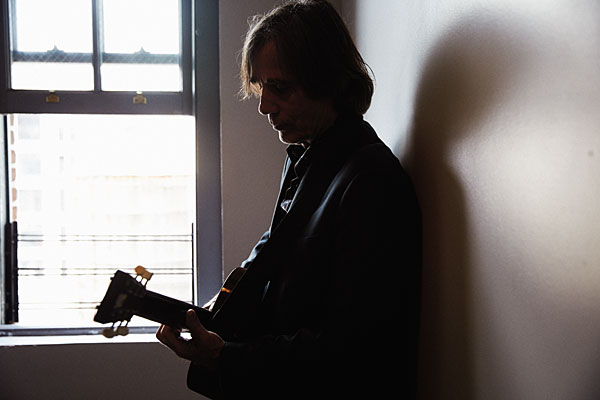| Columns Retired Columns & Blogs |
All the music reviewed on this site is so old, so much in the past.

"'REDNECK FRIEND'!"
Onstage, Jackson Browne smiles and shakes his head.
"'COCAINE'!"
"I could do that, but it would have to be the rehab version." [crowd roars]
"'FOR A DANCER'!"
Oh, wait—I'm yelling that.
"HAPPY BIRTHDAY!"
Browne laughs and bows deeply as the crowd serenades him with an impromptu version of "Happy Birthday," to mark his 66th. Fronting an eight-piece band that rocks—if not as hard as the one he had back in the 1970s, in the Running on Empty days—Browne, roused by the birthday sing-along, launches into a set heavy with tracks from his new album, Standing in the Breach, but studded with enough old favorites—"Doctor My Eyes," "Fountain of Sorrow," and, yes, "For a Dancer"—to keep the predominantly gray-headed crowd feeling glad we've come.
A couple days before, I'd met Browne in a huge basement ballroom of the Beacon Hotel. While his voice was dry and crackled from singing, a state he eased with a large travel mug of tea, Browne was his usual intelligent, modest self, swapping slightly salacious war stories ("Oh man, you're not going to print that, right?"), deep dissections of his art, and calm assessments of the many social issues that have always been part of his career—all with his trademark mischievous smile and world-famous hair, flecked with gray, intact. One thing Browne has always displayed in interviews is honesty, sometimes to his own detriment. When a conversation about his back catalog prompted me to pull out a copy of Mobile Fidelity Sound Lab's 1982 vinyl edition of The Pretender, it triggered a fascinating tangent.
"Oh, wow, I don't remember this being done," he said, taking the record out of its plastic sleeve. "But are you sure there's a second verse in 'The Pretender'?" Big smile.
At the quizzical look that crossed my face, he was off: "When we released The Pretender, one of the things we did was release the song 'The Pretender' as a single, so a different, shorter single version was created. Later, on the next pressing of The Pretender album, they just put out whatever they had. But they printed a bunch of these Pretenders where [the title song] was missing the second verse because the single edit was used. Somebody called me and said, 'I wore out my copy of The Pretender and I bought a new one, and the second verse isn't there.' And also, on 'The Fuse,' there was no fade. It just went CUT! We had made a mark [on the tape] where the fade would start and where it would be out by. They just cut it off and put the leader in, so the next song could start. So on this new version of The Pretender that tune just went 'EEErrrrrr . . . click!' That was unusual for a company like Elektra to do, because at that point it was still Elektra, and because the production people there were very conscientious. But somewhere along the line, somebody made a decision to not go through all the trouble.
"Greg Ladanyi was the original mastering engineer on The Pretender. He wasn't the recordist; John Haeny was, who also recorded For Everyman. He was everybody's secret weapon back in the day. He worked out of Sunset Sound and did a lot of records for Elektra. He recorded the tracks on The Pretender, and then we got a bunch of second engineers to work with us, doing overdubs and stuff like that. When it was time to mix, we started to work with a guy named Val Garay, but we didn't see eye to eye. The only track that's his mix is 'Sleep's Dark and Silent Gate'—we kept that one. But there were ones where he was kind of intractable. There were times where I wanted to do things again, or I wanted to readdress something, and he didn't want to—so we hired his second, Greg Ladanyi, and he was brilliant."

All this audio-engineering minutiae led us to discuss a project progressing on a track parallel to Standing in the Breach—the remastering, and reissuing on high-quality vinyl, of Browne's back catalog. Browne and engineer Doug Sax had recently completed a fresh master of Late for the Sky, to celebrate the album's 40th anniversary. But the release of the new album and the subsequent tour, and navigating the business of pressing LPs as an independent artist rather than as a label signee, slowed the progress of the reissue program, which Browne said will eventually include his entire back catalog and will be released by his own label, Inside Records.
"We lovingly created a fresh master for Late for the Sky on the same original equipment. We really tried to re-create the exact sound that [producer and engineer] Al Schmitt got. Although we did turn up the drums a bit. The drums were light through the whole mix. People came up to me later and said, 'Oh my god, have you ever heard of Led Zeppelin?'
"We also did a new mastering, but it wasn't better. It was more competitive in all the ways that new records are supposedly better: louder, brighter. But because of the way I sang in those days, it doesn't sound better to have this vocal up. It's better warmer because of my particular vocal habits, things that I did as a singer that I no longer do. I would hold these notes too long. Or I would sing really loud and hard, like a trumpet tone or something. The singing is kind of overbearing on that record, if you do to that record what you would do to a contemporary record."
Amazingly, Browne briefly toyed with the idea of re-recording his vocals—after 40 years. "I was even going to put in some corrections, some improved mixes, you know. But the younger guy in this remastering session gave me a look—it was just a look, but it said, 'Really, man? You're gonna re-release this stuff after 40 years and make it "better"?' And I rethought it and decided, 'Okay, we're gonna put it out the way it was.'"

All the music reviewed on this site is so old, so much in the past.

So go to another site.

The meaning of this obviously escapes you. Attacking the messenger, me, won't change the facts that, firstly, the demographic for this magazine is very old, older than mean middle age, and, secondly, the demographic for high-end is also just as old.

amen. or he could actually read the magazine/website and see all the newer music that's on there. but then he couldn't be as snarky and self-righteous.

The parade has passed high-end by. This is in part generational, in part technological.
Simply put, quantity has trumped quality. More, cheaper and easier mass distribution of music of inferior audio quality prevails. Audio quality is not even a secondary consideration compared to means of access. Audio quality is no longer a primary or important commodity.
Interconnectivity of electronic devices is much more a priority than excellence of sound quality. The inherent, unalterable nature of digitized musical signal is homogenized and mediocre. Raising bit rates and sampling frequencies is of importance to only a marginal, exceedingly small and specialized market. Every indication is that these trends are only growing.
The music itself has qualitatively changed, becoming more and more artificial, more and more synthetic, as befits the means of production, reproduction and distribution.
The large majority of audiences at classical concerts is gray-haired. It has been said, not without justification, that jazz reached a state of arrested development after John Coltrane.
Adjusted for inflation, the cost of audiophile gear has skyrocketed in the last, say, 20-25 years, due to ever decreasing sales volumes and a shrinking market. Compare this to computers, in their various forms, which keep getting rapidly cheaper and cheaper due to higher and higher sales volumes. The higher the sales volume, of course, the less the profit margin has to be per unit, and vice versa.
Easily more than half the recordings reviewed in Stereophile have a demographic of well over 50, if not 55-60. The parade has passed.
PS. Snuck into a Jackson Brown concert on my way home from the library at UCSB one night. Left after 10 minutes. "Brown" describes his music perfectly, i.e., drab, i.e., David Geffen, ultra commercial, supposedly noncommercial LA pop. Actually kinda like These Days and Doctor My Eyes, but little else. There was so much other, better music then (e.g., Weather Report, who also performed at UCSB).

Sneak into a Justin Bieber concert. You'll be happier.